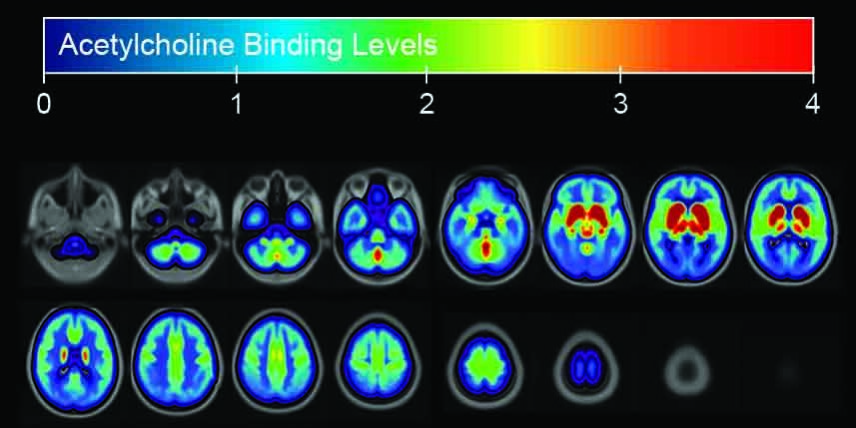Large Implications for Cognitive Aging and Dementia
For the first time, a study shows an online assessment can provide a scientific measure of acetylcholine – a key brain chemical, which declines progressively with cognitive aging and even more quickly with Alzheimer’s disease. The assessment can be self-administered and completed in about three minutes — with big implications for cognitive aging and dementia. The assessment was developed by Posit Science and examined as part of a study funded by the U.S. National Institutes of Health in a collaboration with university-based researchers.
“Currently, it’s impossible for doctors to monitor this brain chemical, despite its vast importance, because it requires expensive imaging equipment and special expertise available at few research centers,” said Dr. Henry Mahncke, CEO of Posit Science. “This breakthrough shows a new path for routine online monitoring of brain health by doctors and individuals.”
The brain’s system that produces chemicals — the neuromodulatory system — impacts mood, learning, attention, responsiveness, and memory. Scientists have long known that the overall system (and its subsystems that produce various brain chemicals) downregulate with aging and various health conditions.
The novel assessment focuses on a specific subsystem — the cholinergic system — that produces acetylcholine, which is often called the “pay attention” chemical, because it is supposed to be produced when you need to pay attention. Production of acetylcholine downregulates with normal aging, and even more severely with pre-dementia and with Alzheimer’s disease and related dementias (ADRD).
Cholinergic function is a key biomarker of overall brain health, regulates the ability of the brain to change (“plasticity”), and is responsible for stronger cognitive performance. Poor cholinergic function is linked to the production of plaque and tangles associated with ADRD, as well other deficits.
Currently, there is no easily accessible way to measure cholinergic function. No standardized blood test to directly measure it exists. Positron Emission Tomography (PET) brain imaging techniques can be used; however, this method is costly, requires specialized expertise, and exposes participants to radiation, limiting its use in clinical practice.
“We developed a digital cognitive test to be a sensitive measure of brain health. To validate the test, we approached the researchers at The Neuro at McGill University, because it is one of a small number of places on the planet with the imaging technology to measure acetylcholine directly,” said Dr. Henry Mahncke. “In this study, they measured acetylcholine alongside cognitive performance using our assessment.”
The imaging study enrolled 92 healthy older adults. Each was measured using: a BrainHQ assessment (Double Decision); two other validated neuropsychological assessments; and a PET scan.
The study showed better scores on the Double Decision assessment correlated with better cholinergic function, indicating that the assessment could estimate cholinergic function without the complexity and risk of doing a PET scan. These results align with prior studies showing a significant relationship between cholinergic function and cognitive performance measured by clinician-administered tools.
The assessment was brief, taking an average of 3 minutes to complete, and demonstrated good usability with reasonable descriptive and psychometric properties. It was sensitive to age within the narrow band measured of 65-83 years (average age 72) and was not influenced by demographic factors such as years of education or gender.
The researchers conclude: “The results support the adoption of this scalable form of biomarker-informed cognitive assessment available to individuals with an internet-connected device.”
“These researchers also are looking at whether our brain exercises can upregulate acetylcholine, which would have a tremendous impact on cognitive aging and ADRD research,” Dr. Mahncke added. “We look forward to learning more.”
Want to take the assessment for yourself? Visit the BrainHQ acetylcholine assessment page to learn more about the study, and register or log in to BrainHQ to try it for free!







